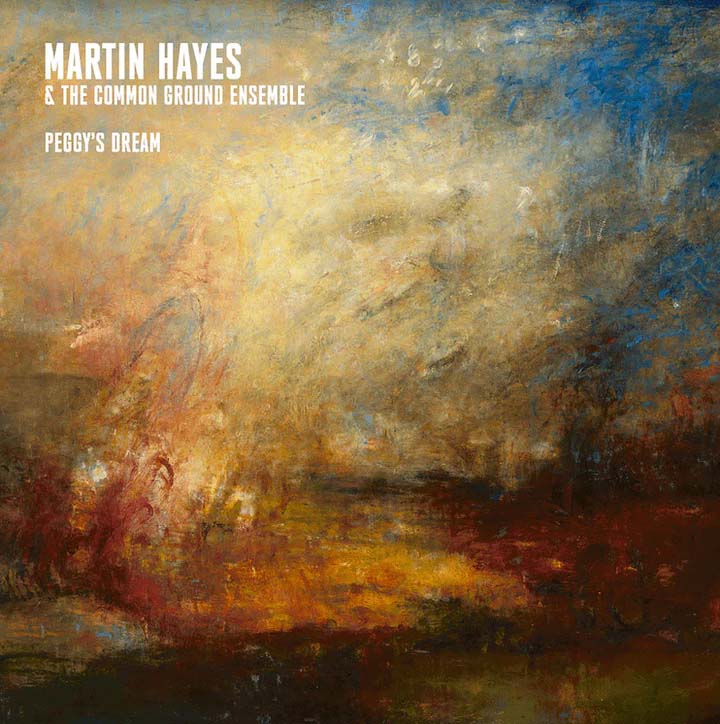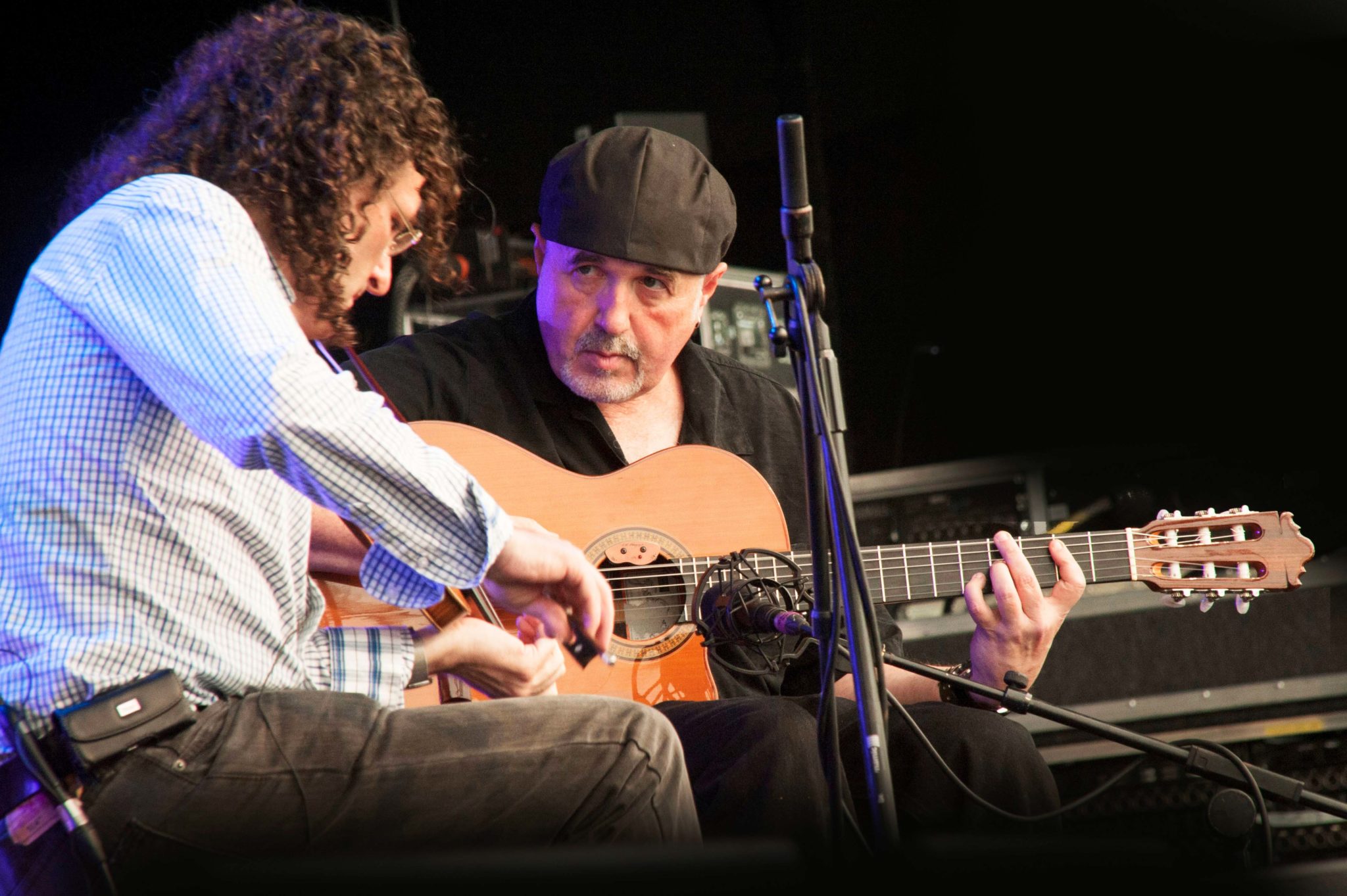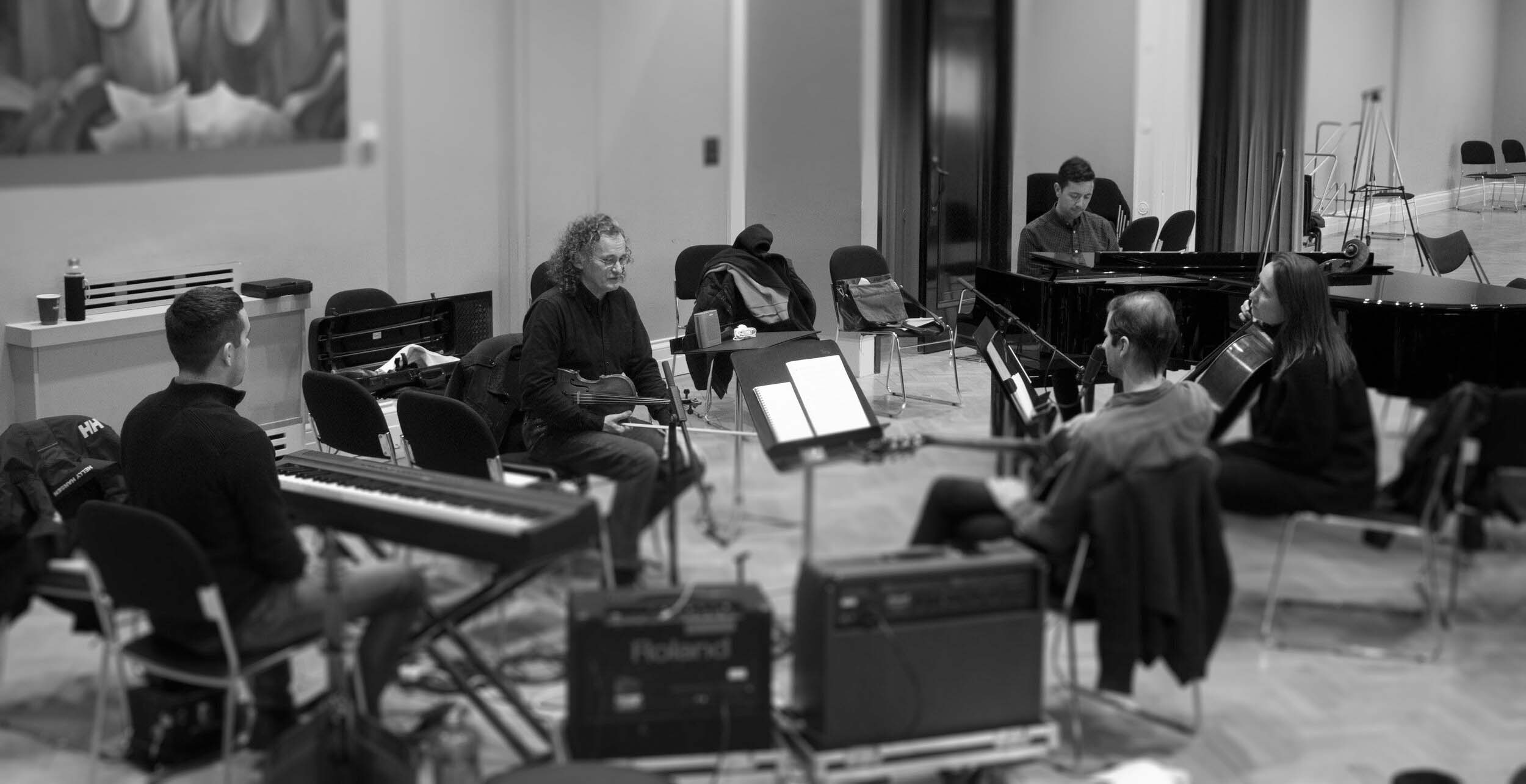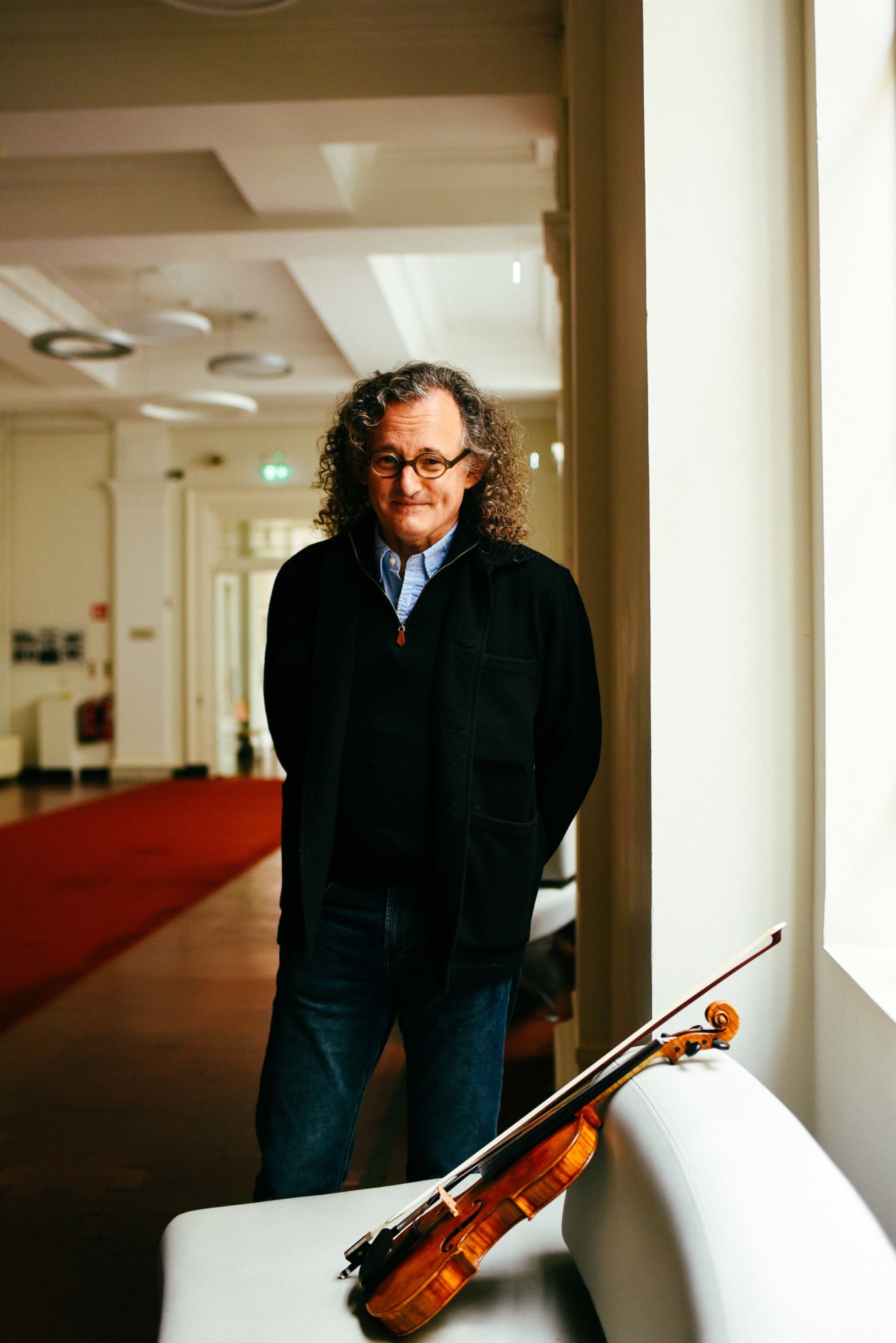- Music
- 25 Apr 23
Martin Hayes: "I wanted this, but I had serious doubts I could ever get this far"

As Martin Hayes and his Common Ground Ensemble release Peggy’s Dream, the Irish music icon discusses spirituality, inequality, streaming, Phoebe Bridgers – and celebrating his mother Peggy and his long-time musical partner Dennis Cahill on his new album.
When you’re young, Martin Hayes reflects, “you’re burdened with the great possibilities of life” – and in particular, the persistent questions: “Will you be able to make it happen? Will you be able to realise your full potential?”
“I had that,” he resumes, sitting across from me in the National Concert Hall’s Kevin Barry Recital Room. His fiddle, which he was playing in the echoing corridors of the historic building during his Hot Press photo shoot just moments before, lies idle beside him.
A few weeks after our conversation, he'll have played a major concert on the NCH’s Main Stage, with his latest project, the Common Ground Ensemble, to celebrate the release of their new album, Peggy’s Dream. It’s another milestone on what’s been an exceptional musical journey for the East Clare-reared, Madrid-based artist – from performing in Chicago pubs as an undocumented Irish immigrant, to playing for presidents, and sharing stages with the likes of Paul Simon, Sting and Phoebe Bridgers.
“I wanted this, but I had serious doubts I could ever get this far,” he says. “I’m really delighted I did, and I’m eternally grateful for it. But I’m glad it didn’t happen all at once. I’m glad I could actually have a little bit of a struggle, and a little bit of not getting there, and wondering if I’d ever get there – because, even though that wasn’t enjoyable, it has left me with a deep appreciation of having achieved something. It’s a real reward.”
His new album takes its title from the track ‘Peggy’s Dream’, which his friend Steve Cooney came across in the James Goodman collection of Irish music. Steve sent on the tune shortly after the death of Martin’s mother, also called Peggy, in 2019.

“In my musical life, there’s this obvious and clear connection with my father [fiddle player PJ Hayes], who I learned music from,” Martin begins. “But my mother was of course equally important in the whole thing. No matter what project I had, she was curious and interested. She would come to the Concert Hall a lot – whenever I’d have a new project, she’d come.
“When she was dying, she said, ‘So, what are you doing next?’ This was the project I was doing next – and I knew she wasn’t going to get to hear it.”
The album is also dedicated to his friend and long-time musical partner, renowned guitarist and fellow founding member of The Gloaming, Dennis Cahill, who passed away in June of last year. Born in Chicago to parents from Kerry, the last time Dennis had been to Ireland was to attend Martin’s mother’s funeral. Recently, his life and legacy was celebrated with a TG4 documentary, Litir ó do Chara.
“Since Dennis passed away there have been mile-marker events,” Martin notes. “Interviews, occasions, concerts, memorials and what not – like a stepped process of dealing with it.”
He received the news about Dennis’ death just a few hours after stepping off stage at Fairview Park in Dublin, having been invited to make a surprise guest appearance during American star Phoebe Bridgers’ headline show.
“That was the night that Dennis died,” Martin nods. “I got back to my hotel room, slept for a while, and then the phone went off.
“I spent the next day in airports, getting connecting flights,” he continues. “I spent the whole day travelling – like I had for years with Dennis. Except I was alone.”

Martin Hayes and Dennis Cahill. Credit: Bryan Ledgard
In my previous interview with Martin, he spoke openly about the importance of spirituality in his life. It’s something he continues to turn to in difficult times, he says.
“We need some solidity somewhere in our lives – something that can provide confidence and strength, that can help you overcome fear and doubts and worries,” he remarks. “Something that propels you to move forward and get the most out of life. The only place I know where I can find that is in the realm of the spiritual.
“The spiritual part of life is an important part, because we need to be able to reflect, in order to appreciate,” he adds. “And to find inspiration, and find depth and meaning in things. And to create depth and meaning.”
He’s also remarkably open-minded when it comes to music, continuing to work with artists from diverse worlds of sounds and styles. His Common Ground Ensemble features pianist Cormac McCarthy, Crash Ensemble’s Kate Ellis on cello, guitarist Kyle Sanna, and Brian Donnellan on bouzouki, harmonium and concertina.
“There’s a certain amount of indulgence on my part,” Martin smiles, “in terms of going out there and surrounding myself with all these great musicians and sounds and wonderful instruments – and almost luxuriating in it, like some people might in a nice bath!
“I come from quite a traditionalist viewpoint on this music, and I still hold a lot of that,” he adds. “But I am open-minded. I see this music as music primarily, and as traditional music in a secondary sense. The main purpose is music.”

Martin Hayes and The Common Ground Ensemble
The world – and Ireland in particular, it seems – have become more open-minded as listeners too. Categorising artists into strict genres is increasingly becoming a thing of the past – with Martin featured on Irish label Faction Records’ roster alongside the likes of James Vincent McMorrow and Sorcha Richardson.
“It’s not as big a deal anymore,” he reasons. “It’s great being on the same roster as James Vincent McMorrow and people like that. The whole world is changing. Who listens to one genre anymore? Nobody. It’s like our diet. We now eat Middle Eastern, Italian, Greek, Japanese, Spanish food. At one time we just ate bacon and cabbage! It’s the same with music.”
The accessibility of music through streaming services, he reckons, is partly to thank.
“Even five minutes of curiosity can land you in some other world of music, by simply taking your phone out,” he says. “They have algorithms that will funnel you right down to where your inclinations go. Whereas, I used to have to search out record shops, and talk to the guy in the record shop, who’d say, ‘Well, I think you might like this album…’ So once upon a time, the algorithm was the shop owner. It’s a bit different now.”
In case you’re wondering, Martin is strictly an Apple Music man.
“I’m all Apple,” he asserts. “Apple is now one of the largest corporations in the world, but I was devoted to Apple when people were sneering at it – when everyone was using PCs and Microsoft. I don’t enjoy the Spotify portal, I find it confusing. Apple is more straightforward.”
He takes out his phone to show me what’s in his current music library, with appearances from fellow Irish fiddle player Seán Keane, as well as Cork composer Linda Buckley’s 2020 album From Ocean’s Floor. He’s not closed off to the world of pop, either – though he’s “ashamed to say” that he “didn’t know who Phoebe Bridgers was at the time that she reached out.”
“So people had to explain to me,” he resumes. “Then I had to go, ‘Okay, I’m obviously going to listen to the music.’ And I was super impressed by her. She’s a great musician, and a great creative artist. She really has something very special. So I was delighted. It’s always nice if some new emerging artist, from a whole new generation, can say, ‘Hey, I’m interested in what you do!’ That’s very flattering for me.”
Despite his interest in the emerging sounds around him, when selecting tunes to explore himself, he often finds himself looking back in time, into his own collection.
“I have tapes of myself when I was collecting tunes at age 15,” he reveals. “I would play them twice over, and put them on a cassette. I taped the neighbouring musicians as well. A lot of them would come in and out of our house, and I’d record them. So I’ve lots of home recordings of tunes, and some fairly obscure stuff. I still go back to that.”

Martin Hayes. Copyright Miguel Ruiz.
As well as being surrounded by music in his family home in Co. Clare from a young age, he was also immersed in Fianna Fáil politics – though Martin distanced himself from the party as a young man, and went on to campaign for Barack Obama in the U.S. in 2008. He remains politically-minded, with his worldview also shaped by his own experiences as an undocumented immigrant in the U.S..
“There’s this conflict between our system of organisation – our economics, our politics, our borders, our identities – and this other thing, which is humanity: human need, human equality, human rights,” he reflects. “The two things are not lining up. They have two different sets of conflicting interests.
“There’s inequality in our societies – between the sexes, between the top earners and lower earners, between the educated and the uneducated,” he continues. “And then there’s inequality across the globe, from societies where we extract minerals and resources, who are struggling to exist. So the problem isn’t migration. The problem is global inequality, and global bad politics, I suppose. The migrant issue is a symptom of a larger problem.”
The politics he’s interested in, he says, isn’t “the politics of the good and the bad, or the right and the wrong.”
“It never breaks down like that,” he asserts. “When we engage in politics like that, the opposing side strengthens up, and we don’t get anywhere. Compromise is a principle. We think compromise is a defeat, a loss, a failure. But nothing is achieved, except through compromise.
“The polarisation seems to be happening everywhere,” he adds. “And there’s little danger signals cropping up here. Our politics for most of the 20th century has been largely moderate – slightly centre-right, slightly centre-left, never very extreme, very constant, very stable. There’s a sense that stability may be falling away. So we’ll see where it all leads!”
For now, Martin’s already focused on his own future plans – noting that, once he’s put an album to bed, within a week or two, his brain has already jumped to the next project.
“I want to do a solo thing,” he tells me. “That’s easier to organise, and pay for, and put together – but artistically it might be more challenging than any band.”
Why so?
“Because there’s absolutely nowhere to hide,” he smiles. “You have to dig deeper.”
Peggy’s Dream is out now. Martin Hayes and the Common Ground Ensemble play Vicar Street, Dublin on October 20 and the Royal Theatre, Castlebar on October 21.
Martin also plays Another Love Story at Killyon Manor, Co. Meath (August 20).
RELATED

- Music
- 20 Dec 25
30 Best Folk Albums of 2025

- Music
- 19 Dec 25
Florence Road release cover of 'Georgia' by Phoebe Bridgers.

- Music
- 19 Dec 25
New Irish Songs To Hear This Week

- Competitions
- 19 Dec 25
WIN: €250 Gift Card for Ticketmaster

- Pics & Vids
- 19 Dec 25





